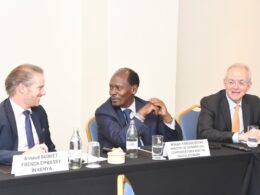On November 19, five women founders stood on the Johannesburg Stock Exchange trading floor, collectively claiming over $100,000 in equity-free funding from Naspers and Prosus’s Tech FoundHER Africa Challenge. The symbolism was deliberate: women entrepreneurs at the heart of Africa’s financial capital, receiving non-dilutive capital from one of the continent’s most powerful technology investors.
The winners represented a compelling cross-section of African innovation, spanning agricultural technology, event management platforms, and gender-based violence support systems across Kenya, Nigeria, South Africa, and the Democratic Republic of Congo.
But behind the celebration lies a more complicated story. For Naspers—the South African technology conglomerate that became one of the world’s most valuable companies through its early bet on Tencent—this wasn’t just another corporate responsibility check-writing exercise. It was a very public attempt at course correction following sharp criticism over diversity failures in its flagship venture capital operations.
The Winners: Innovation Across Four Countries
First Place: Esther Kimani – Farmer Lifeline (Kenya)
Esther Kimani’s Farmer Lifeline took top honors with technology addressing one of African agriculture’s most persistent challenges: early detection of crop pests and diseases. The company provides solar-powered, AI-enabled devices that help smallholder farmers identify threats before they destroy entire harvests.
For context, smallholder farmers—who produce most of Africa’s food—lose up to 40% of crops to pests and diseases annually. Traditional extension services rarely reach remote farming communities quickly enough to prevent outbreaks. Farmer Lifeline’s approach combines accessible hardware (solar-powered for areas without grid electricity) with AI diagnostics that can identify threats farmers might miss until it’s too late.
The technology represents the kind of appropriate innovation Africa needs: sophisticated enough to solve complex problems, accessible enough for resource-constrained users, and addressing real economic pain points where paying customers exist.
Second Place: Folayemi Agusto – Tix Africa (Nigeria)
Tix Africa, founded by Folayemi Agusto, secured second place with a self-service platform for event ticketing, sales, and payments. While event ticketing might seem less impactful than agricultural or health technology, it addresses real friction in Nigeria’s growing entertainment and events economy.
Nigeria’s event industry—from concerts to conferences, comedy shows to corporate gatherings—has exploded in recent years as the country’s creative economy gains global attention. However, ticketing infrastructure remains fragmented, with many events still relying on cash transactions, manual tracking, and informal distribution creating revenue leakage and fraud opportunities.
Tix Africa’s platform provides event organizers with professional tools for ticket management, payment processing (critical in markets where cash remains dominant), and sales analytics—professionalizIng an industry ready for digital transformation.
Joint Third Place: Margaret Wanjiku – Pollen Patrollers (Kenya)
Margaret Wanjiku’s Pollen Patrollers develops smart beehive technology, addressing another agricultural challenge: sustainable beekeeping and pollination management. While details of the specific technology weren’t provided, smart beehive solutions typically involve sensors monitoring hive health, honey production, temperature, humidity, and bee activity patterns.
Beekeeping represents significant economic opportunity across Africa—honey commands premium prices, pollination services support agricultural productivity, and beekeeping requires relatively modest land compared to other farming activities. However, traditional beekeeping faces challenges including hive diseases, unpredictable productivity, and difficulty monitoring distributed hives across large areas.
Technology-enabled beekeeping could help smallholder beekeepers optimize production, detect problems early, and improve income from apiculture—an important diversification strategy for farming communities.
Joint Third Place: Jenny Ambukiyenyi Onya – Neotex (Democratic Republic of Congo)
Jenny Ambukiyenyi Onya’s Neotex brings AI tools to small livestock farmers in the Democratic Republic of Congo. The DRC’s inclusion among winners is particularly significant—the country rarely features in African tech success stories despite enormous population (over 100 million) and agricultural potential.
Small livestock farming—chickens, goats, rabbits—represents crucial livelihood strategy for rural households, providing protein, income, and financial resilience. However, disease outbreaks, poor feeding practices, and lack of veterinary access create high mortality rates and limited productivity.
AI tools for livestock management could include disease detection through image recognition, feeding optimization algorithms, market price tracking, and connection to veterinary services—addressing multiple pain points simultaneously for farmers who often operate with minimal external support.
AI for Good Category: Leonora Tim – Gender Rights in Tech (South Africa)
Leonora Tim’s Gender Rights in Tech won the AI for Good category with technology and data tools supporting survivors of gender-based violence (GBV). South Africa faces epidemic levels of GBV—the country has some of the world’s highest rates of rape, intimate partner violence, and femicide.
Technology solutions for GBV survivors navigate sensitive terrain. They must provide genuinely useful resources while protecting user safety and privacy. Poorly designed GBV tech can endanger survivors by creating digital trails abusive partners might discover or by centralizing sensitive data vulnerable to breaches.
Gender Rights in Tech’s approach—providing tech and data tools—suggests focus on empowering survivors with information, resources, and potentially evidence documentation while maintaining appropriate security protocols. The AI component might involve chatbots providing information, natural language processing analyzing patterns to inform policy, or machine learning identifying high-risk situations.
The fact that a GBV-focused venture won the AI for Good category reflects growing recognition that technology addressing social challenges deserves equal standing with commercial applications.
The Geographic Spread: Four Countries, Different Contexts
The winners’ distribution across Kenya (2), Nigeria (1), South Africa (1), and DRC (1) tells its own story about African tech ecosystems:
Kenya dominated with two winners, reflecting the country’s position as East Africa’s technology hub. Nairobi’s ecosystem has produced multiple exits, hosts regional headquarters for international tech companies, and benefits from strong telecommunications infrastructure and supportive government policies. That both Kenyan winners focus on agriculture (crops and bees) reflects the sector’s continued economic importance even in relatively urbanized economies.
Nigeria, Africa’s largest economy and most populous country, contributed one winner. While Nigeria’s tech ecosystem is larger than Kenya’s in absolute terms, Lagos-based startups often focus on fintech, e-commerce, and digital services rather than agriculture—reflected in Tix Africa’s event technology focus.
South Africa, hosting the awards ceremony at its own stock exchange, contributed the GBV-focused winner. South Africa’s ecosystem is more mature than most African markets but has faced criticism for concentration in financial services and limited expansion beyond major metros.
DRC’s inclusion breaks new ground. The country rarely appears in African tech winner circles despite massive population and market potential. Infrastructure challenges, political instability, and limited venture capital presence have kept DRC off most tech investors’ maps. Neotex’s recognition could signal growing attention to overlooked markets.
The Naspers Baggage
To understand why this competition exists, you need to understand what preceded it.
Naspers Foundry, the company’s South African-focused venture capital fund launched in 2019 with R1.4 billion ($95 million at the time), became a lightning rod for criticism over its investment patterns. Analysis of the fund’s portfolio revealed glaring diversity gaps—minimal investment in women-led ventures despite South Africa’s vocal startup community calling for inclusive capital allocation.
The criticism intensified as Naspers touted commitments to supporting African entrepreneurship while its actual deployment patterns suggested business as usual: capital flowing primarily to male-founded companies, often with connections to established networks.
For a company that built extraordinary wealth by recognizing value others missed—its $32 million investment in Tencent in 2001 became worth over $100 billion at peak—the inability to see potential in women founders looked less like risk management and more like blind spot.
The pressure grew loud enough that Naspers couldn’t ignore it.
Strategic Pivot or PR Exercise?
Tech FoundHER Africa Challenge represents Naspers and Prosus’s response to that criticism. The program explicitly targets women founders, provides equity-free capital eliminating dilution concerns, and culminates in a high-visibility JSE event generating media coverage and social proof.
But whether this represents genuine strategic pivot or sophisticated PR depends on what happens next.
Genuine commitment would look like:
- Systematic changes in Naspers Foundry investment criteria prioritizing diverse founding teams
- Transparent reporting on portfolio diversity metrics across all Naspers/Prosus venture activities
- Leadership accountability for diversity outcomes in capital deployment
- Long-term support for Tech FoundHER winners beyond one-time grants—follow-on funding, mentorship, network access to Naspers’s extensive portfolio companies and partnerships
- Expansion of equity-free funding programs reaching more women founders annually across additional African markets
PR exercise would look like:
- One-off competition generating headlines without changing underlying investment patterns
- Continued concentration of larger venture checks flowing to traditional (male) founder networks
- Lack of transparency about broader portfolio diversity
- Winners receiving capital but minimal ongoing support or access to Naspers network
- Program quietly fading once immediate criticism subsides
The five founders on the JSE stage deserve celebration regardless. They built businesses compelling enough to win competitive selection across what was presumably a strong applicant pool. They’re solving real problems—agricultural productivity, economic infrastructure, gender-based violence—that matter profoundly to African communities.
What the Prize Money Actually Means
While the total prize pool exceeded $100,000, the distribution across five winners (first, second, and two joint-third places plus a category winner) means individual amounts vary significantly. Rough estimates suggest:
First place (Farmer Lifeline): Likely $30,000-$40,000 Second place (Tix Africa): Approximately $20,000-$25,000
Joint third places (Pollen Patrollers, Neotex): Roughly $10,000-$15,000 each AI for Good category (Gender Rights in Tech): Possibly $10,000-$15,000
This capital might fund:
- For hardware companies (Farmer Lifeline, Pollen Patrollers, Neotex): Manufacturing initial device batches, field trials, certification processes
- For platform companies (Tix Africa, Gender Rights in Tech): Technology development sprints, customer acquisition campaigns, payment infrastructure setup
- For all winners: 3-6 months runway for small teams, initial market expansion, regulatory compliance, working capital
It’s meaningful early-stage capital, but it’s not transform-your-business-overnight money. These founders will need follow-on funding—either more grants, revenue growth, or eventually venture capital—to scale sustainably.
The real value may come from validation and network access. Winning Naspers-backed competition provides credibility useful in subsequent fundraising conversations. Media coverage from the JSE ceremony creates brand awareness. Access to Naspers network—if genuinely provided—could open doors to customers, partners, and investors across the conglomerate’s extensive African portfolio.
The Broader Context: Women Founders in African Tech
Tech FoundHER winners are outliers in an ecosystem with persistent gender gaps:
Funding disparities: Women-led African startups receive approximately 2-3% of venture capital deployed on the continent—even lower than the dismal ~2% global average. This means for every $100 invested in African startups, women founders receive $2-3 while their male counterparts receive $97-98.
Pipeline myths: Despite claims that few women-founded companies exist, programs like Tech FoundHER consistently find strong applicants when they explicitly recruit women—suggesting distribution rather than supply problems. The issue isn’t insufficient women founders; it’s insufficient capital reaching them.
Network effects: Venture capital remains heavily relationship-driven, and African VC networks skew overwhelmingly male, creating structural barriers to women founders accessing decision-makers. Investment partners meet founders through their networks—and if those networks are homogenous, deal flow remains homogenous.
Sector stereotypes: Women founders often face assumptions they’ll build “women’s businesses” (beauty, fashion, parenting) rather than infrastructure, fintech, or B2B software. Yet Tech FoundHER winners span agricultural technology, event platforms, and livestock management—demonstrating women founders’ actual sector diversity.
Harsher terms: When women founders do raise capital, research suggests they face higher dilution, more restrictive terms, and greater skepticism during due diligence compared to male founders with similar metrics. They’re asked different questions in pitch meetings—men about vision and growth, women about risks and downsides.
Against this backdrop, programs explicitly supporting women founders serve crucial roles—provided they’re designed for genuine impact rather than optics management.
What Comes Next: The Real Test
For Esther Kimani, Folayemi Agusto, Margaret Wanjiku, Jenny Ambukiyenyi Onya, and Leonora Tim, the immediate priority is deploying capital effectively while leveraging competition visibility for customer acquisition, partnership development, and future fundraising. The JSE platform and media coverage provide momentum—but momentum fades quickly without execution.
For Naspers and Prosus, the accountability moment arrives in how their broader venture activities evolve. Will Naspers Foundry’s 2025 investments reflect diversity commitments? Will Tech FoundHER become an annual program with a growing budget? Or will portfolio transparency improve, and will winners receive genuine ongoing support or just congratulatory press releases?
For African women founders watching from the sidelines, Tech FoundHER provides encouraging signal—major investors are at least acknowledging the problem—but systemic change requires more than one competition. It requires LP pressure on fund managers, transparent diversity reporting, accountability for portfolio composition, and cultural shifts in how venture capital operates across Africa.
The five founders on the JSE stage deserve their moment. They’ve built businesses worth backing across agriculture, events, and social impact. They’re creating jobs, solving problems, and demonstrating that women founders can compete and win when given platforms to showcase their work.
But let’s be clear-eyed about what this represents: a good start that matters most if it’s followed by sustained commitment rather than remaining an isolated gesture from a company managing past criticism.
The real story of Tech FoundHER Africa won’t be written at the JSE awards ceremony. It’ll be written in Naspers’s investment decisions over the next two years—when cameras aren’t rolling and criticism has faded.
Will Farmer Lifeline’s next funding round include Naspers Foundry? Will Tix Africa get introductions to Prosus’s portfolio companies operating events businesses? Or will these founders join a genuine portfolio receiving ongoing support, or will they receive their checks and polite congratulations before Naspers moves on to the next PR initiative?
For now, five founders have capital to deploy and recognition that matters. That’s worth celebrating.
Whether it’s part of genuine transformation or sophisticated reputation management? Check back in 2026 when we see where Naspers’s venture capital actually flows.












